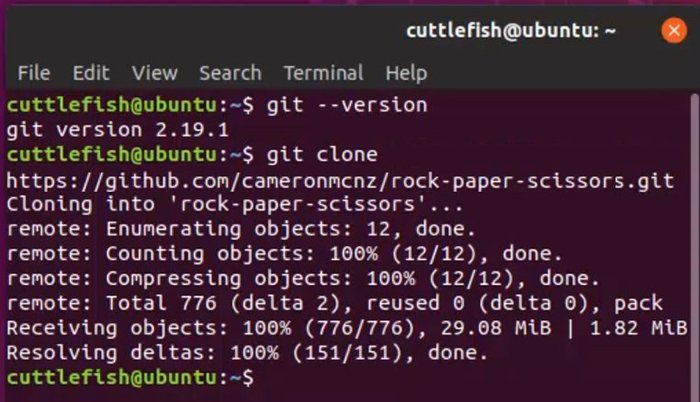

When cloning a repository it's possible that you might encounter some errors. > remove: Total 10 (delta 1), reused 10 (delta 1) > Unpacking objects: 100% (10/10), done. > remote: Compressing objects: 100% (8/8), done. $ git clone > Cloning into `Spoon-Knife`. Type git clone, and then paste the URL you copied earlier.

Īlternatively, to clone your repository in Desktop, click Set up in Desktop and follow the prompts to complete the clone.Ĭhange the current working directory to the location where you want the cloned directory. To clone the repository using an SSH key, including a certificate issued by your organization's SSH certificate authority, click SSH, then click. To clone your repository using the command line using HTTPS, under "Quick setup", click.

It's often made if you don't initialize the repository with a README when creating it. To clone and open the repository with GitHub Desktop, click Open with GitHub Desktop.įollow the prompts in GitHub Desktop to complete the clone.įor more information, see " Cloning a repository from GitHub to GitHub Desktop." Cloning an empty repositoryĪn empty repository contains no files. As you can see, it is very easy to clone a git repository in Ubuntu.On, navigate to the main page of the repository. If you want to only clone a specific branch (e.g working) and not the entire repository, use the -branch option in git clone. Similarly, here is the command to clone the last 10 commits of your repository. Here is the command to clone the last 1 commit of your repository. # sudo git clone -depth=n Īlso read : VPS vs Shared Hosting – In-Depth Comparison Here is the syntax for shallow clone, where n is the number of most recent commits you want to clone. It will be much faster and take up very little space on your system. In such cases, you can do a shallow clone where you can specify the last n commits you want to be cloned. If you need to clone a big repository with large commit history, it can be very time consuming. # sudo git clone įor example, let us say you want to clone your repository to /home/developer folder # sudo git clone /home/developer Here’s the command to clone your repository to a specific folder.
#Sudo git clone command how to#
You will be asked for your password for authentication, after which Git will automatically download the copy of your repository to your present working directory.Īlso read : How to Upgrade Python in Ubuntu Replace username with your Github username, and repository-name with your repository’s name. Note the URL for your repository, and use it in the git clone command as shown below.
#Sudo git clone command install#
Sometimes, the URL can also be of the form read : How to Install Virtualenv in Ubuntu įor example, your git repo (e.g demo) will have the following URLs, depending on the platform. Log into your development platform such as Github, and note its URL. #cd /home/ubuntu/Įvery remote git repo will have a URL. Open terminal and navigate to the location (e.g /home/ubuntu) where you want the repo to be copied. Let us say you want to clone a remote repository from Github, Bitbucket, or any other cloud platform to your local machine. There are different ways to clone a git repository, depending on your requirement. Unless you clone a git repo, you will not be able to contribute changes to it. In this case, the git command will create a new directory, set it up for use with git and copy files into it.

Git clone is basically a command to point to an existing repository and make a copy of it, at another location. You can use these steps to clone a repository in github, bitbucket, gitlab and other popular git-based developer platforms. In this article, we will look at how to clone a git repository in Ubuntu. You need to clone a git repository to your local desktop or laptop, before you can start making any changes to it. However, it requires you to have a copy of the git repository before you can begin working on it. Git is a popular version control system used by many businesses around the world.



 0 kommentar(er)
0 kommentar(er)
